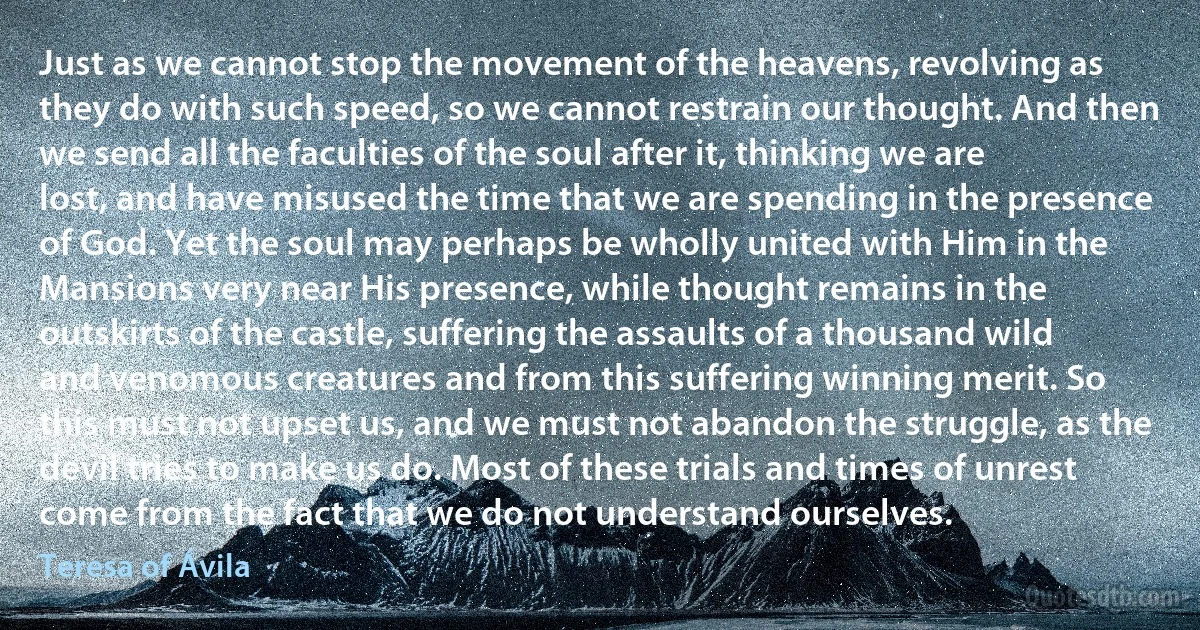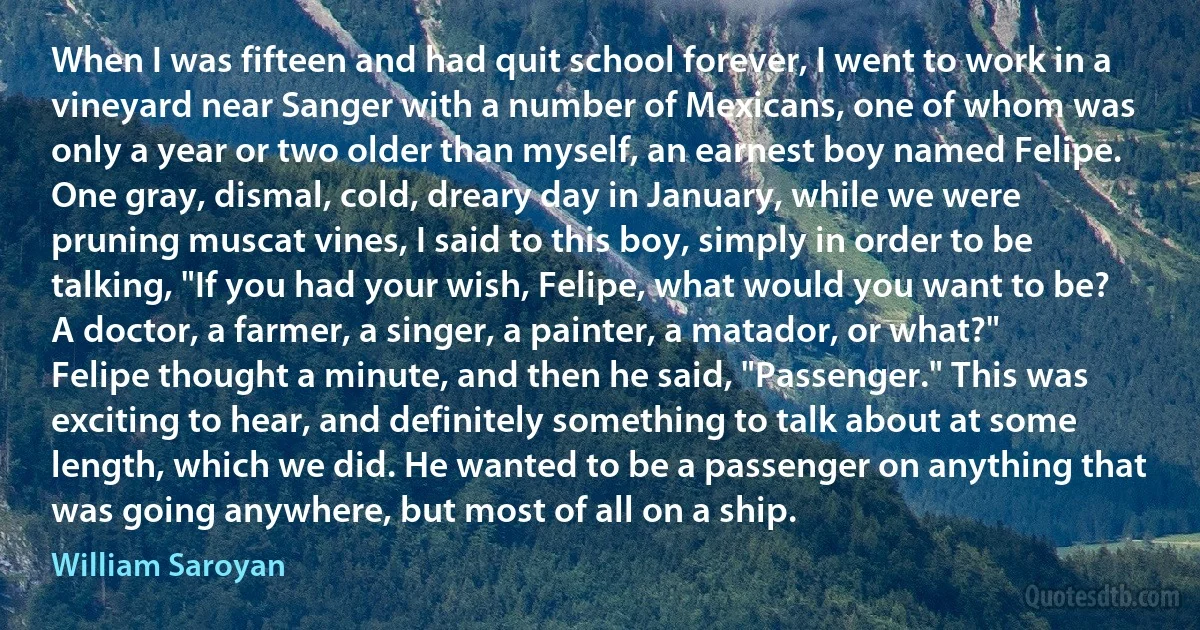Near Quotes - page 57
A secularist journalist confirms: "In spite of this 'near total literacy' the population growth rate of Muslims who constitute one-fourth of Kerala's population is as high as 2.3 per cent per year, which is more than even the national PGR [= population growth rate] of 2.11 per annum and is almost double the PGR of Hindus in Kerala itself."

Koenraad Elst
There's a group of UK business people, wonderful guys who want to invest in Sirte, on the coast, near where Gaddafi was actually captured and executed as some of you may have seen. And they literally have a brilliant vision to turn Sirte, with the help of the municipality of Sirte, to turn it into the next Dubai. The only thing they've got to do is clear the dead bodies away and then they'll be there.

Boris Johnson
Love is enough: draw near and behold me
Ye who pass by the way to your rest and your laughter,
And are full of the hope of the dawn coming after;
For the strong of the world have bought me and sold me
And my house is all wasted from threshold to rafter.
- Pass by me, and hearken, and think of me not!

William Morris
A group of fisherwomen on their way home from a distant market held on an afternoon, were overtaken by a heavy hailstorm at nightfall in the middle of their way, and so were compelled to take shelter in a florist's house near at hand. Through the kindness of the florist they were allowed to sleep that night in one of his rooms, where some baskets of sweet-smelling flowers had been kept for supplying his customers. The atmosphere of the room was too good for the fisherwomen, and they could not, owing to it, get even a wink of sleep, till one of them suggested a remedy by saying, Let each of us keep her empty basket of fish close to her nose, and thus prevent this troublesome smell of flowers from attacking our nostrils and killing our sleep.' Every one gladly agreed to the proposal, and did accordingly ; and soon all began to snore. Such, indeed, is the power and influence of bad habits over all those who are addicted to them.

Ramakrishna
Instead of this, I tell
what I hope will pass as truth.
A blunt thing, not lovely.
The truth is seldom welcome,
especially at dinner,
though I am good at what I do.
My trade is courage and atrocities.
I look at them and do not condemn.
I write things down the way they happened,
as near as can be remembered.
I don't ask why, because it is mostly the same.
Wars happen because the ones who start them
think they can win.

Margaret Atwood
I don't need them to tell me what it feels like to be poor ... I already know how this feels, how it smells and how it tastes! When I talk to them ... I want them to tell me about their hopes and aspirations, about their dreams... about the road ahead and how they imagine it will shape up out in front of them to make the dreaming and hoping come true. I ask them about assistance, about the health, and about their families near or far.

Manuel Rivera-Ortiz
For, while the heart is full of thoughts for a little group of selves, near and dear to us, how shall the rest of mankind fare in our souls? What percentage of love and care will there remain to bestow on the "great orphan”? And how shall the "still small voice” make itself heard in a soul entirely occupied with its own privileged tenants? What room is there left for the needs of Humanity en bloc...? He who would profit by the wisdom of the universal mind, has to reach it through the whole of Humanity without distinction of race, complexion, religion, or social status. It is altruism, not ego-ism even in its most legal and noble conception, that can lead the unit to merge its little Self in the Universal Selves. It is... to this work that the true disciple of true Occultism has to devote himself if he would obtain... divine Wisdom and Knowledge.

Helena Petrovna Blavatsky
Om or Aum (Sk.). A mystic syllable, the most solemn of all words in India. It is "an invocation, a benediction, an affirmation and a promise and it is so sacred, as to be indeed the word at low breath of occult, primitive masonry. No one must be near when the syllable is pronounced for a purpose. This word is usually placed at the beginning of sacred Scriptures, and is prefixed to prayers. It is a compound of three letters a,u,m, which, in the popular belief, are typical of the three Vedas, also of three gods-A (Agni) V (Varuna) and M (Maruts) or Fire, Water and Air. In esoteric philosophy these are the three sacred fires, or the "triple fire”in the Universe and Man, besides many other things...

Helena Petrovna Blavatsky
A memory steals in from lost heavens of Truth,
A wide release comes near, a Glory calls,
A might looks out, an estranged felicity.
In glamorous passages of half-veiled light
Wandering, a brilliant shadow of itself,
This quick uncertain leader of blind gods,
This tender of small lamps, this minister serf
Hired by a mind and body for earth-use
Forgets its work mid crude realities;
It recovers its renounced imperial right,
It wears once more a purple robe of thought
And knows itself the Ideal's seer and king,
Communicant and prophet of the Unborn,
Heir to delight and immortality.
All things are real that here are only dreams,
In our unknown depths sleeps their reserve of truth,
On our unreached heights they reign and come to us
In thought and muse trailing their robes of light.

Sri Aurobindo
Anyway, this back-and-forth seesawing between Iris and Vickie continued through the contest until, when the final scores were announced, it turned out they had tied - with Iris winning by virtue of the IFBB tie-breaking rule (she had more first place votes). Actually, this was a near thing. Vickie Gates at her absolute best is indeed a worthy opponent for Iris Kyle. But Vickie wasn't at her absolute best and hasn't been for a couple of years. So what we nearly had is one more instance (last year's Ms. Olympia, the 2001 Ms. International) where Iris Kyle received unfair treatment from the judges.

Iris Kyle
Few will doubt that humankind has created a planet-sized problem for itself. No one wished it so, but we are the first species to become a geophysical force, altering Earth's climate, a role previously reserved for tectonics, sun flares, and glacial cycles. We are also the greatest destroyer of life since the ten-kilometer-wide meteorite that landed near Yucatan and ended the Age of Reptiles sixty-five million years ago. Through overpopulation we have put ourselves in danger of running out of food and water. So a very Faustian choice is upon us: whether to accept our corrosive and risky behavior as the unavoidable price of population and economic growth, or to take stock of ourselves and search for a new environmental ethic.

E. O. Wilson
A daring pilot in extremity;
Pleas'd with the danger, when the waves went high
He sought the storms; but for a calm unfit,
Would steer too nigh the sands, to boast his wit.
Great wits are sure to madness near alli'd;
And thin partitions do their bounds divide:
Else, why should he, with wealth and honour blest,
Refuse his age the needful hours of rest?
Punish a body which he could not please;
Bankrupt of life, yet prodigal of ease?
And all to leave, what with his toil he won
To that unfeather'd, two-legg'd thing, a son:
Got, while his soul did huddled notions try;
And born a shapeless lump, like anarchy.

John Dryden
In September 2007, a poll of fifty songwriters conducted by the magazine Q listed "Hallelujah" among the all-time "Top 10 Greatest Tracks" with John Legend calling Buckley's version "as near perfect as you can get. The lyrics to 'Hallelujah' are just incredible and the melody's gorgeous and then there's Jeff's interpretation of it. It's one of the most beautiful pieces of recorded music I've ever heard."

Jeff Buckley
He has become the most prolific as well as most gifted and versatile novelist of his generation. Not one member of it approaches his fluency, energy, inventiveness, effrontery. ...For sheer intelligence, learning, inventiveness, imaginative capacity, writer's professional cunning - no English novelist comes near him.

Anthony Burgess
Naval forces are able, without resorting to diplomatic channels, to establish offshore anywhere in the world, air fields completely equipped with machine shops, ammunition dumps, tank farms, warehouses, together with quarters and all types of accommodations for personnel. Such task forces are virtually as complete as any air base ever established. They constitute the only air bases that can be made available near enemy territory without assault and conquest; and furthermore, they are mobile offensive bases, that can be employed with the unique attributes of secrecy and surprise - which attributes contribute equally to their defensive as well as offensive effectiveness.

Chester W. Nimitz
As the body is clad in the cloth, and the flesh in the skin, and the bones in the flesh, and the heart in the whole, so are we, soul and body, clad in the Goodness of God, and enclosed. Yea, and more homely: for all these may waste and wear away, but the Goodness of God is ever whole; and more near to us, without any likeness; for truly our Lover desireth that our soul cleave to Him with all its might, and that we be evermore cleaving to His Goodness. For of all things that heart may think, this pleaseth most God, and soonest speedeth.

Julian of Norwich
Ever the more clearly that the soul seeth this Blissful Cheer by grace of loving, the more it longeth to see it in fulness. For notwithstanding that our Lord God dwelleth in us and is here with us, and albeit He claspeth us and encloseth us for tender love that He may never leave us, and is more near to us than tongue can tell or heart can think, yet may we never stint of moaning nor of weeping nor of longing till when we see Him clearly in His Blissful Countenance. For in that precious blissful sight there may no woe abide, nor any weal fail.

Julian of Norwich
It is strange...that sometimes people assume the worst of children if they come from poor families. I remember being astonished when I took my daughter to a party given by her schoolfriend's parents. They lived in a lovely, big house very near the block of council flats where I grew up. The mother was very friendly to me, and said how pleased she was that our daughters were friends because obviously she could have nothing to do with ‘those dreadful scary rough children from the council flats'. I didn't want to embarrass her by saying that I had once been one of those very children.

Jacqueline Wilson
Cornstalk was often seen with his warriors. Brave without being rash, he avoided exposure without shrinking; cautious without timidity in the hottest of the battle, he escaped without a wound. As one of the warriors near him showed some signs of timidity, the enraged chief, - with one blow of his tomahawk, cleft his skull. In one of the assaults, Colonel Fields, performing his duty bravely, was shot dead. ... The faltering of the ranks encouraged the savages. "Be strong! Be strong!" echoed through the woods over the savage lines in the tones of Cornstalk; and as Captain after Captain, and files of men after files of men, fell, the yells of the Indians were more terrific and their assaults more furious.

Cornstalk
Long centuries before any foreigner had settled in India, the unity of the country was materialised in symbols. What more suggestive story than that, for instance, of Sati, Siva's wife, whose body, divided, after her death, in fifty-one pieces, is lying still in fifty-one different places, therefore revered as "tirthasthans,” throughout the Indian Peninsula? One lies near Peshawar, one in Kamakhya, not far from India's eastern boundaries; one in Benares, one in the very extreme South, others here and there. Fifty-one pieces, but one body; fifty-one "tirthasthans” in the name of the same Goddess, scattered over the same territory. Indeed, among the different interpretations that can be given of the legend of Sati, one can take it in this light: Sati is India herself, personified; India's soil, sacred from end to end, is, with all its variety, the actual body of one great Goddess... And Indian nationalism means: devotion to this great Goddess.

Savitri Devi



